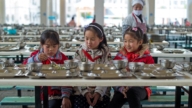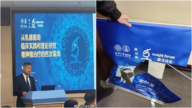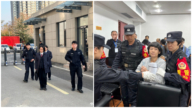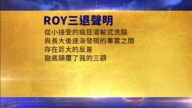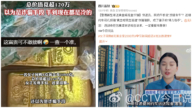【新唐人2014年09月08日讯】中共国务院9月4日宣布将推出“高考改革方案”,主要有十点举措。包括增加全国统一命题的省份,减少体育艺术特长加分项目,不分文理科,高考总成绩由三门统一高考分数加三门高中学科分数等。大陆中学教师分析说,虽然这些尝试是有益的,但是改变不了应试教育的根本弊端,也未实现考生之间的公平竞争。
改革方案当中最受人关注的,是高考成绩“3+3”方案。也就是高考总成绩,由统一高考的语文、数学、外语3个科目的成绩,和“高中学业水平考试”3个科目成绩组成。高考中,语文、数学、外语科目不变、分值不变,不分文理科,外语科目提供两次考试机会。而“高中学业水平考试”科目将由学生在思想政治、历史、地理、物理、化学、生物等科目中自主选择。
上海、浙江将在今年分别出台高考综合改革试点方案,从今年秋季入学的高一学生起开始实施。作为其他省市高考改革参考。
苏州某中学语文教师袁雪成认为,尽管这种尝试是有益的,但是对于应试教育的弊端,并没有大的改变。
苏州某中学教师袁雪成:“ 高考指挥棒的作用,对中学,小学,甚至幼儿园的影响太大。为什么呢?因为高考,比如说,你这样考后面肯定要影响到怎么教,怎么学,怎么复习这个问题。然后初中,小学也跟着它,甚至幼儿园也跟着它。我以后要高考的,我就要照这方面学之类的,这个影响太大。”
袁雪成认为,应该是高考围绕中小学的学习来考试,而不是反过来。他建议,公立学校只需按照教学大纲来组织教学,而不是以高考为目标。公立学校应该把教学跟高考脱钩。高考的培训让社会和民办学校承担。
陕西国企职工李毓的孩子明年即将参加高考。李毓认为,虽然具体的方案比以前相对有一些进步,但是只要这个体制不改,那么所有治标不治本的东西,仍然会流于“上有政策,下有对策”。如果所有的教育没有自由,仍然是应试教育的话,所有这些举措,最终都是形式。
在促进公平方面,这次改革方案提出,提高中西部地区人口大省的高考录取率。在异地高考问题上,则提出,从明年起增加使用全国统一命题试卷的省份,这样在全国范围内,会有更多省份之间的考生,可以异地高考。
但是根据“学而思高考研究中心”教师王宏斌分析说,北京目前使用的“北京卷”,除北京外,没有其他省份在使用。并且,北京的高考政策结合户籍制度,使得从乡镇进城工作人员的“随迁子女”,只能参加高等职业学校招生考试。因此从理论上,目前北京难以实现异地高考。
如何保证公平竞争又减轻学生负担?在中国这两个目标之间存在着矛盾。如果沿用“一考定终身”的方式,给学生的压力太大。但是如果高考参照平日成绩,权贵者就更容易作弊,和以权谋私。李毓认为,高考种种的问题和矛盾,最终指向制度,也指向道德下滑。
陕西国企职工李毓:“ 所有好的政策,在这种环境下,在这种人心已经不古的,道德底线一再被突破的大环境下,很多良好的举措都不可能最终收到你预期的效果。 我总觉得,现在全国像一盘乱棋,任何事情都是错综复杂的。假如你就是找到制度的根源,但是制度你又怎么去恢复它呢?”
李毓又表示,解决矛盾的唯一办法,就是要把教育领域放开,国家不要垄断学历,允许民间自主办学,教育资源也不要集中配置,要均匀分布,让偏远地区的孩子得到起码的教育资源。
香港媒体评论说,这种朝令夕改式的改革,被一小部分舆论左右,受既得利益阶层所绑架。 而最大的不幸就是莘莘学子,他们疲于应付、疲于奔命。
采访编辑/秦雪 后制/萧宇
Will New College Entrance Exam Bring Reform?
Sept 4, the party’s State Council announced a reform plan
on the College Entrance Examination (CEE),
which includes 10 moves.
Among them are increasing the number of provinces
that employ unified exam papers,
decreasing projects that offer bonus points on sports and art,
stopping the differentiation of liberal arts and science,
and the total CEE score being composed of 3 required subjects
and 3 optional subjects from the Academic High School Test.
Some middle school teachers commented that the reform
might be beneficial but won’t completely change
the disadvantages of the exam-oriented education system;
neither will it realize fair competition among candidates.
The conspicuous point in the reform plan is the “3+3″ plan.
The total CEE score will be the sum scores
of the 3 required subjects
“Chinese", “Mathematics" and “Foreign Language"
from the unified national CEE
and scores of another 3 optional subjects
from the High School Academic Test.
“Chinese", “Mathematics" and “Foreign Language"
will stay the same in the new CEE system,
but the exam on ‘Foreign Language"
will be offered twice instead of once.
For the other 3 subjects, students can choose from
Politics, History, Geography, Physics, Chemistry or Biology.
The new system will be tested in Shanghai and Zhejiang
this year.
It’ll apply to the high school students who enroll this autumn.
The experiences in Shanghai and Zhejiang will serve
as a reference to other provinces.
Yuan Xuecheng, a mainland middle school teacher
said that even if the reform may be beneficial,
it won’t completely change the disadvantages of the
examination-oriented education system.
Yuan Xuecheng: “The CEE system severely influences
middle school, elementary,and even kindergarten education.
For example, how CEE will be tested will influence
how teachers teach, how students learn and
review the knowledge in all the pre-high school education.
It’s like I am going to be tested in the CEE
so I need to study this way.
The influence is very significant."
Yuan said that the CEE should be determined by
pre-high school education; it shouldn’t be the other way round.
He said public schools should just follow a teaching syllabus
instead of aiming at the CEE.
Li Yu, working in a state-run enterprise,
has a child who will take the CEE next year.
Li stated that even if the reform plan has advantages,
as long as the political system is not reformed,
it won’t eradicate the problem essentially.
It will end up being fruitless.
If there is no freedom in education
and the exam-oriented education system continues,
all these reforms are only scratching the surface.
As for promoting fairness and equity,
the reform proposes to increase the enrollment rate
in the densely-populated provinces in the middle-west.
As for taking the exam from different provinces,
the reform proposes to increase the number of provinces
that employ national unified exam papers.
In this way, students can take the exam in various places.
Wang Hongbin, a teacher from “Xue Er Si CEE Research Center",
said that right now Beijing is using “Beijing CEE papers"
and all other provinces aren’t using Beijing’s exam papers.
Beijing’s policy is combined with the household registration
system.
Children of those who work in Beijing but registered
elsewhere
can’t take the CEE in Beijing but vocational college
entrance exams.
So it’s hard for students from other provinces
to take the CEE in Beijing.
How to ensure fair competition and relieve students’ workload?
In China, these two targets produce conflicting results.
The way “one exam determines a person’s whole life"
really gives students tremendous pressure.
But, if the CEE refers to students’ everyday performance,
it’ll be a lot easier for those who hold power and wealth
to indulge in corrupt practices.
Li Yu stated that all problems and conflicts regarding CEE
Li Yu: “In this environment, when public morality
is not what it used to be and the moral bottom line
has dropped again and again,
all good policies can’t be as effective as you’d expect.
I feel like right now the whole country is in a chaos.
A lot of things are complicated and entangled together.
When tracking back to the source of the regime,
how can you fix it then?"
Li Yu also stated that the only way to solve the problem is to
stop government from monopolizing education resources.
Private schools should be promoted.
Education resources should be evenly distributed
instead of being centralized.
Thus, children living in remote and isolated areas
can enjoy basic education resources as well.
Hong Kong media commented that
the constantly changing reform
is influenced by a small group of people
and is also being hi-jacked by interest groups.
The least fortunate are the students who struggle to keep up.
Interview & Edit/Qinxue Post-Production/XiaoYu



